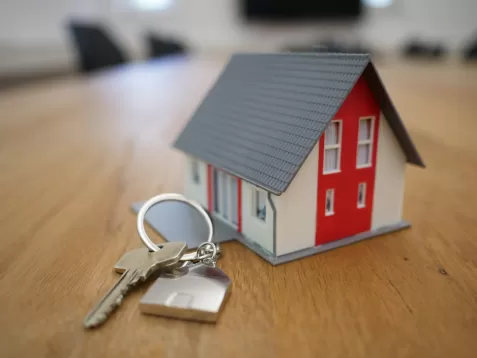Buying a fixer-upper can seem like a romantic idea – when you get to turn that shabby house into your dream home. But there are many things to consider when purchasing a house that needs repairs, so we created a guide to help you determine when to purchase that fixer-upper and when to walk away.
Just about anytime can be a good time to buy a fixer-upper, as long as you can get the right price on the property you’re eyeing. What defines the right price? We’re so glad you asked!
There are a few things to consider before purchasing a fixer-upper, among them your level of handiness (are you a Tim the Tool Man Taylor or a Mr. Bean?), and whether you plan to live in it awhile or resell it quickly. Either way, you’ll need to get out the ol’ calculator and figure out the cost of renovations before you make an offer.
What is a fixer upper?
One man’s trash is another man’s treasure. Or in the case of homes, one person’s tear-down is another person’s, “Look at the potential!”
The perfect fixer-upper is the home that everybody will want in the future but that nobody wants right now. It’s a home that needs “substantial” improvement in order to be considered desirable or possibly even habitable. If you have the vision and the wherewithal to see beyond the weeds in the yard, floral wallpaper and aged water heater, you can land a property that you (or another buyer) will love someday in the future. You just have to be willing to put in the time, work and investment to get it from “ick” to “oooh!”
RELATED: Come home to happy. How curb appeal can improve your mood (and add value)
What to look for in a fixer upper
- Good location
Do we need to state the obvious? Of course, we do – location matters a whole bunch. No matter how much granite and hardwood and climbing roses and outdoor kitchen action you add to your property, if the location stinks when you bought, it will still stink after you do the work. Of course, if you plan to flip the house – or sell quickly after fixing it up – what you consider an ideal location is not important. You will want a location that potential buyers would find desirable, however, or even the fixed upped house will be a tough sell.
- Good “bones”
The overall layout of the home should be acceptable to you and desirable to other buyers if you plan to resell at some point. That means there is no need to remove load-bearing walls or add on rooms or do major structural changes that will cost a lot of money. It needs to have the right number of rooms in the right locations.
- Reasonable renovations
When it comes to fixer-uppers, there are easy fixes and hard fixes. To be clear, unless you own a construction company or love unending projects, you should choose a fixer-upper with easy fixes, not hard ones.
Generally speaking, these renovations fall in the easy category:
- New paint (inside and/or out)
- New carpet or flooring
- Adding fans, changing light fixtures
- Replacing cabinets or doors
- Replacing a few broken windows
- Improving landscape
If the home has any of these challenges, think twice – no three times – before purchasing:
- Walls that need to be moved, particularly those that are load-bearing
- HVAC, plumbing or central air repairs or additions
- Foundation repairs
- Need for a new roof
- Upgrades to plumbing
- Significant window replacement
- Addition of a concrete driveway
- Full kitchen/bath remodel
- An addition
Chelsey and Kyle B. had the option of buying a newer home in a neighborhood less desirable to them or purchasing an older family home that needed a lot of work in a neighborhood they loved. “We never would have bought this house if my husband wasn’t so handy,” Chelsey explains. “We’ve been here two years and, so far, we’ve done almost all the work ourselves.” Chelsey and Kyle are able to live in the home while they work their way through the list of house needs – like replacing a water heater and water-damaged sub floor – on their way to their list of house wants. It will take them some time, but they will eventually have a home they love.
RELATED: Winter-Friendly House Projects: Northern Nevada,
Winter-Friendly House Projects: Southern Nevada
Get inspections
We cannot stress enough how important it is to get home inspections to assess the true state of your prospective project. Home issues are often not visible to the untrained eye (that’s right, we just accused you of having untrained eyes). Inspectors, on the other hand, know what to look for and when to be concerned.
Jon Moretti of Resolution Realty in Henderson depends on inspections when advising his clients. “Some clients see cracks from a home settling and get concerned, but cracks are not always an issue. A water spot can mean an old problem that got fixed or an ongoing problem. I rely on inspectors to let me know which problems are the real problems.”
Most inspectors are generalists who can look for signs of damage and defects, but if you have a specific concern (e.g. the orange liquid that comes out of the faucets), hire an inspector who specializes in that area.
Items most inspectors will check for:
- Chimney
- Electrical system
- Lead-based paint
- Asbestos
- HVAC
- Wood damage
- Foundation
- Roof
- Sewer or septic system
- Water systems/plumbing
Specialty areas you may want checked:
- Soil stability (particularly if you are on a hillside)
- Gases and chemicals (e.g. radon, methane)
- Mold
- Document inspection (they can check for lot encroachment, easements, square footage verification and zoning)
Bear in mind, what you learn from your inspections can serve as a negotiating tool with the seller, potentially offsetting the cost of the inspections.
How much should you pay for a fixer-upper?
Get ready homebuyers, it’s math time! What you pay should be based on what the home will cost when the renovation is completed. To figure out the cost of renovation, talk to construction and renovation specialists and estimate high. Include materials and labor — yours and other people's — and expect things to cost more than the estimates you get. Then subtract the total of these costs from the home's likely market value after renovation, based on comparable real estate prices in the neighborhood. Go ahead and deduct another 5 to 10 percent for extras you decide to add; unforeseen problems and mishaps that have to be dealt with; and inflation. What's left should be your offer.
According to the National Association of Home Builders, for maximum resale value, remodeling investments should not raise the value of your house more than 10 to 15 percent above the median sale price of other houses in your area.
Is a fixer-upper in your future?
If you think you might want to purchase a fixer-upper, first you’ll need a lender and a real estate agent. Lucky for you, we’ve got some knowledgeable ones in our searchable database. We also have some great homebuying programs that’ll stretch the heck out of your purchasing dollar.


